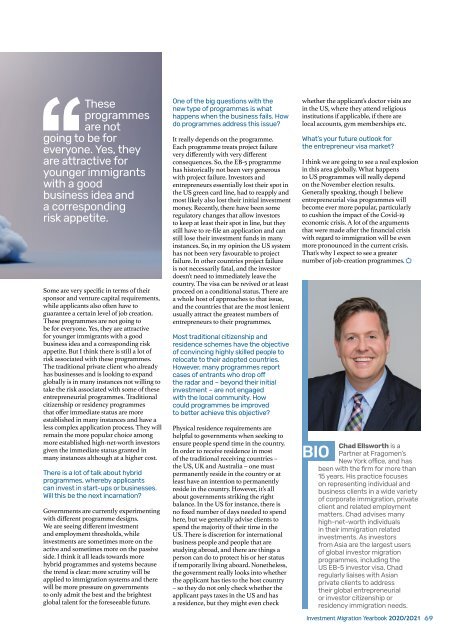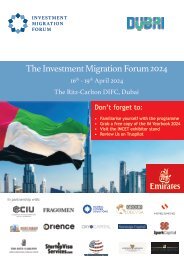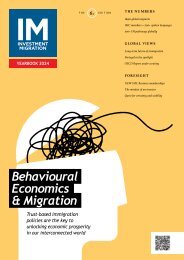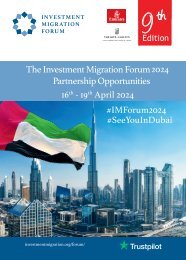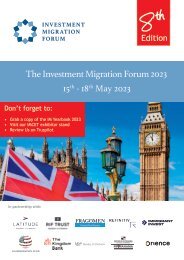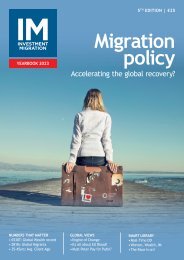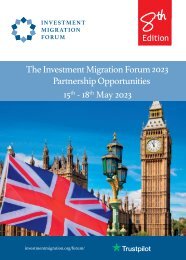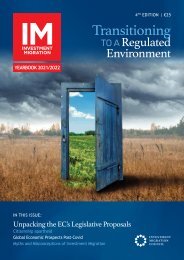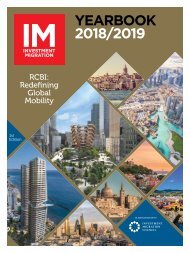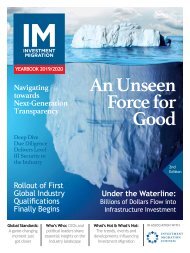IM Yearbook 2020/21
Born from the need for a global, credible, “go-to” publication, the 3rd IM Yearbook offers valuable access to a prime target audience of top industry influencers, decision makers, and the foremost referral network to the world’s most influential Investment Migration programmes: Government officials such as Heads of CIU’s, policy makers, academics, migration agents, law firms, wealth managers, financial advisors, real estate developers, and international firms involved in investment migration.
Born from the need for a global, credible, “go-to” publication, the 3rd IM Yearbook offers valuable access to a prime target audience of top industry influencers, decision makers, and the foremost referral network to the world’s most influential Investment Migration programmes: Government officials such as Heads of CIU’s, policy makers, academics, migration agents, law firms, wealth managers, financial advisors, real estate developers, and international firms involved in investment migration.
You also want an ePaper? Increase the reach of your titles
YUMPU automatically turns print PDFs into web optimized ePapers that Google loves.
These<br />
programmes<br />
are not<br />
going to be for<br />
everyone. Yes, they<br />
are attractive for<br />
younger immigrants<br />
with a good<br />
business idea and<br />
a corresponding<br />
risk appetite.<br />
Some are very specific in terms of their<br />
sponsor and venture capital requirements,<br />
while applicants also often have to<br />
guarantee a certain level of job creation.<br />
These programmes are not going to<br />
be for everyone. Yes, they are attractive<br />
for younger immigrants with a good<br />
business idea and a corresponding risk<br />
appetite. But I think there is still a lot of<br />
risk associated with these programmes.<br />
The traditional private client who already<br />
has businesses and is looking to expand<br />
globally is in many instances not willing to<br />
take the risk associated with some of these<br />
entrepreneurial programmes. Traditional<br />
citizenship or residency programmes<br />
that offer immediate status are more<br />
established in many instances and have a<br />
less complex application process. They will<br />
remain the more popular choice among<br />
more established high-net-worth investors<br />
given the immediate status granted in<br />
many instances although at a higher cost.<br />
There is a lot of talk about hybrid<br />
programmes, whereby applicants<br />
can invest in start-ups or businesses.<br />
Will this be the next incarnation?<br />
Governments are currently experimenting<br />
with different programme designs.<br />
We are seeing different investment<br />
and employment thresholds, while<br />
investments are sometimes more on the<br />
active and sometimes more on the passive<br />
side. I think it all leads towards more<br />
hybrid programmes and systems because<br />
the trend is clear: more scrutiny will be<br />
applied to immigration systems and there<br />
will be more pressure on governments<br />
to only admit the best and the brightest<br />
global talent for the foreseeable future.<br />
One of the big questions with the<br />
new type of programmes is what<br />
happens when the business fails. How<br />
do programmes address this issue?<br />
It really depends on the programme.<br />
Each programme treats project failure<br />
very differently with very different<br />
consequences. So, the EB-5 programme<br />
has historically not been very generous<br />
with project failure. Investors and<br />
entrepreneurs essentially lost their spot in<br />
the US green card line, had to reapply and<br />
most likely also lost their initial investment<br />
money. Recently, there have been some<br />
regulatory changes that allow investors<br />
to keep at least their spot in line, but they<br />
still have to re-file an application and can<br />
still lose their investment funds in many<br />
instances. So, in my opinion the US system<br />
has not been very favourable to project<br />
failure. In other countries project failure<br />
is not necessarily fatal, and the investor<br />
doesn’t need to immediately leave the<br />
country. The visa can be revived or at least<br />
proceed on a conditional status. There are<br />
a whole host of approaches to that issue,<br />
and the countries that are the most lenient<br />
usually attract the greatest numbers of<br />
entrepreneurs to their programmes.<br />
Most traditional citizenship and<br />
residence schemes have the objective<br />
of convincing highly skilled people to<br />
relocate to their adopted countries.<br />
However, many programmes report<br />
cases of entrants who drop off<br />
the radar and – beyond their initial<br />
investment – are not engaged<br />
with the local community. How<br />
could programmes be improved<br />
to better achieve this objective?<br />
Physical residence requirements are<br />
helpful to governments when seeking to<br />
ensure people spend time in the country.<br />
In order to receive residence in most<br />
of the traditional receiving countries –<br />
the US, UK and Australia – one must<br />
permanently reside in the country or at<br />
least have an intention to permanently<br />
reside in the country. However, it’s all<br />
about governments striking the right<br />
balance. In the US for instance, there is<br />
no fixed number of days needed to spend<br />
here, but we generally advise clients to<br />
spend the majority of their time in the<br />
US. There is discretion for international<br />
business people and people that are<br />
studying abroad, and there are things a<br />
person can do to protect his or her status<br />
if temporarily living aboard. Nonetheless,<br />
the government really looks into whether<br />
the applicant has ties to the host country<br />
– so they do not only check whether the<br />
applicant pays taxes in the US and has<br />
a residence, but they might even check<br />
whether the applicant’s doctor visits are<br />
in the US, where they attend religious<br />
institutions if applicable, if there are<br />
local accounts, gym memberships etc.<br />
What’s your future outlook for<br />
the entrepreneur visa market?<br />
I think we are going to see a real explosion<br />
in this area globally. What happens<br />
to US programmes will really depend<br />
on the November election results.<br />
Generally speaking, though I believe<br />
entrepreneurial visa programmes will<br />
become ever more popular, particularly<br />
to cushion the impact of the Covid-19<br />
economic crisis. A lot of the arguments<br />
that were made after the financial crisis<br />
with regard to immigration will be even<br />
more pronounced in the current crisis.<br />
That’s why I expect to see a greater<br />
number of job-creation programmes.<br />
Chad Ellsworth is a<br />
BIO Partner at Fragomen’s<br />
New York office, and has<br />
been with the firm for more than<br />
15 years. His practice focuses<br />
on representing individual and<br />
business clients in a wide variety<br />
of corporate immigration, private<br />
client and related employment<br />
matters. Chad advises many<br />
high-net-worth individuals<br />
in their immigration related<br />
investments. As investors<br />
from Asia are the largest users<br />
of global investor migration<br />
programmes, including the<br />
US EB-5 investor visa, Chad<br />
regularly liaises with Asian<br />
private clients to address<br />
their global entrepreneurial<br />
or investor citizenship or<br />
residency immigration needs.<br />
Investment Migration <strong>Yearbook</strong> 2O2O/2O<strong>21</strong> 69


